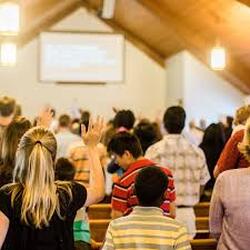 We do not have it all together, but together we have it all! This is true for individuals as well as churches. As an individual Christian, I don’t have everything I need to be everything that God is making me to be. I don’t have everything, in myself, that I need to face life’s challenges. But in the Church, I do. Christianity is not a solo venture. It is true that we are called into the Kingdom of God as individuals. I must face my need for repentance and forgiveness alone. But that begins a journey that God has designed to be traveled with others. There are many pictures of the Church in the Bible. But there is one that rises above all of them, and that is the Church as the “Body of Christ.” “For as in one body we have many members, and the members do not all have the same function, so we, though many, are one body in Christ, and individually members one of another” (Romans 12:4-5). It is inconceivable, and frankly hilarious, to think of my elbow trying to drive a car down the road. But when the rest of my body joins in then it is possible. Of course, if I haven’t had my coffee that morning it may be a little dangerous. So, why do we Christians insist on trying to live the Christian life all by ourselves? It is like allowing your elbow to drive you to work. How do we do that? We regularly put other groups and events in front of being with our Church family on Sundays and throughout the week. We think that taking time out of our busy schedules for bible study or fellowship with fellow believers is not only a waste of our time but really not necessary. And worst of all, we insist on facing our fears and disappointments in life alone. I have noticed that at the most crucial time for a believer to be with other believers in life, they usually withdraw from the Church. Not only is our ability to navigate struggles hindered by this withdrawal, but our ability to do the work of the Kingdom of God is impossible! The work of ministry is not for a few, but for all in the Church. Again, God has designed it this way. “And he gave the apostles, the prophets, the evangelists, the shepherds and teachers, to equip the saints for the work of ministry, for building up the body of Christ,” (Ephesians 4:11-12). So much of the work of ministry is being hamstrung by believers who see the Church primarily as being there to minister to them, instead of, being there to provide them a place to use their God given ministry skills and gifts. “And let us consider how to stir up one another to love and good works, not neglecting to meet together, as is the habit of some, but encouraging one another, and all the more as you see the Day drawing near” (Hebrews 10:24-25). Yes, we are saved as individuals, but we are also saved into the Body of Christ. It is how God had determined we should grow in Christ. It is how we find His power and grace expressed in a way that can truly touch our situations in life. Because, we do not have it all together, but together we have it all!  The last thing I ever wanted to do growing up is disappoint my Grandfather. We were close, and I loved and respected him. His approval was vital to me. There were a lot of people in my life that I could care less to disappoint; however, to disappoint those special people whose opinion I value greatly is devastating. For us Christians, that person often is God. When we fail God, it is so hard to recover. Of course, the enemy knows this about us and fans that flame of guilt with even more guilt. Of all the struggles I witness in people, as a pastor, the one that is overwhelmingly present in the lives of believers is guilt. Guilt can chain us down. Guilt can cause us to lose the hope and joy we should have as God’s child. 2 Corinthians 7:10 tells us that godly grief or guilt leads to repentance and then salvation, but worldly guilt leads to death. God is always ready to forgive and restore us when we fall, but Satan will continue to use that guilt against us for as long as we let him. In my last post, I talked about Peter’s denial and restoration. All four of the Gospels record the failure of Peter, but Luke is the only one that adds a very interesting statement that Jesus makes during that upper room scene (Luke 22:31-34). He says that Satan has demanded to “sift you like wheat.” The sifting of wheat was a common occurrence in the time of Jesus. The heads of wheat were beat off the stocks on the threshing floor and then collected into containers. It was then necessary to sift out the chaff and other debris that would be inadvertently gathered up with the wheat kernels. The sifting that Satan wanted to do was weaken and destroy Peter’s (and all the rest of the Disciple’s) faith through his failure and the death of their Lord. Satan wanted to destroy his hope and joy through his failure. There are two things to notice, however. First, Satan has to get permission to attack us. Jesus says, “Satan demanded to have you.” He demanded because he has no power against us except that which God allows. Our struggles are used by God to bring us to Christlikeness. Our failures are a part of that process. Which means our failures are know to God and are used by God to make us better. So, Satan’s attacks on us are only tools for God to use to mature us. The second thing to notice in this Luke passage is that Jesus tells Peter that he has prayed for him. The “hina” clause in the last half of the sentence (usually translated, “so that” or “that” in our English bibles) points to the expected result of that prayer. Jesus is not saying, “My prayer for you is that you do not lose faith.” He never tells us the content of his prayer, only the result. When you then read Jesus’ next statement, it all becomes clear, “And when you have turned again, strengthen your brothers.” Jesus did not pray that Peter would not fail. He prayed that Peter’s failure would not cause him to lose faith but strengthen his faith. Jesus knew Peter would deny him. He also knew that that failure would not destroy him since Jesus had prayed for him. So instead of the whole ordeal being a hope and joy stealer, it become a growth and encouragement bringer. And so, it is with our failures. Sin brings guilt; guilt leads to repentance; repentance brings growth. This is God’s way of building us up in Christ, overcoming our failures with love and forgiveness.  There is one thing that is true of all Christians; we are under construction. There is nobody who is not still learning. There is nobody who has arrived at a state of complete maturity. We all are still making mistakes. And for those who will be honest, lots of them! But there is good news; God doesn’t expect us to be perfect. We are under construction, and the general contractor is God himself; we are God’s works in progress. My problem, however, is that life keeps giving me ample opportunity to doubt this truth. Just like the guy who always seems to fall for the old “quarter super glued to the floor trick,” I am always falling for the illusion that I can handle the struggles in life on my own. And it takes me by surprise. I blow it repeatedly. When will I ever learn? Will I ever learn? If you are like me, then I have some encouraging news for you. The Apostle Peter thought he could handle the challenges of life on his own. In the upper room, the night that Jesus was betrayed and arrested, Peter stood and stated to the Lord with great confidence, “I will lay down my life for you” (John 13:36-38). He thought he had the ability to handle whatever life would bring his way. Boy, was he wrong! That very night Jesus informed him that he would deny him not once, but three times. And sure enough, before sunrise, Peter did just that. He then went away weeping bitterly (Mark 14:72). Why is it that we think we can handle life all by ourselves? We try, and then we fail, rinse and repeat. The biggest lesson any of us will learn as we walk with God is that we can do nothing apart from the Lord (John 15:5). The exciting thing about Peter’s story is not that he learns this lesson, but it is what his learning of that lesson reveals to us. After Jesus’ resurrection, Peter, still struggling with his enormous failure, decides to go fishing (John 21:1-11). He goes back to what he knows he can do. Without Peter being aware, Jesus shows up and has him cast his net on the “right-hand side of the boat.” The text does not say this, but I can imagine that Peter, who had not caught any fish all night, said under his breath, “Where do you think it has been all night!” He does it, however, and pulls in a huge haul of fish. Interestingly, this is exactly what happened the first time he met Jesus (Luke 5:1-11) when he was called to be Jesus’ disciple. The first step toward recovery from our mistakes is a renewal of our calling to be Jesus’ disciple. We must constantly return in our memory to that glorious moment when we first believed. In so doing, we will begin to recapture the power and joy of our true identity in Christ. Next, we see Jesus restoring Peter to ministry confidence. It is this process that brings the greatest insight (John 21:15-19). Three times Peter denied Jesus, and three times Jesus asks Peter if he loves him. And three times, Peter confirms his love for Jesus. And finally, three times Jesus gives Peter a ministry responsibility. What you notice on a closer look is that the word for “love” that Jesus uses is different than the word for “love” that Peter uses. Jesus asks, “Do you have a committed love for me?” Peter replies, “I have affection for you.” Peter could not say he had a committed love for Jesus because he had proven that his love was conditional through his denials. But on the third time, Jesus asks, “Do you even have affection for me?” This question cuts Peter deeply because Jesus has brought into question his inadequacy to have even affection for Jesus. Taking Jesus’ questions alone, it seems almost cruel, even though it is understandable given Peter’s failure, that Jesus would keep asking Peter the question. However, Jesus’ purpose was not cruelty but enlightenment. With each question, Peter’s confidence in his own ability decreased, but at the same time, the responsibility that Jesus gave to Peter increased; feed my lambs, tend my sheep, feed my sheep. As Peter was coming to the end of his own ability, Christ’s ability was growing in Peter and so was his ministry opportunity. Peter was under construction. This is what God is doing to you and me. Our struggles may bring us disappointment when we fail to respond as we should, but they are also bringing us awareness of our need to depend on our Lord. We may not always be aware of this process, but that does not mean it isn’t happening. Every failure brings greater dependence, which in turn brings greater responsibility and the hope of greater glory for God. It is this process that is the Christian life. The purpose of this humble attempt at blogging is to help all of us make it through the stages of this construction with hope and joy! |
Pastor MikePastor at GodWorks for over 13 years. In pastoral ministry for over 30 years. Husband, father and fly-fisherman. Archives
May 2020
Categories |
Photos used under Creative Commons from Elvert Barnes, Jeanne Menjoulet
 RSS Feed
RSS Feed
